
Nicholas More Seymour is an Australian musician, painter, and record producer. He is the founding bass guitarist and a mainstay of the Australia and New Zealand based rock group Crowded House, and is also the younger brother of Mark Seymour, singer-songwriter-guitarist in the rock band, Hunters and Collectors.
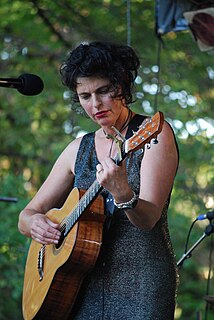
Deborah Ann Conway is an Australian rock singer-songwriter and guitarist, and had a career as a model and actress. She was a founding member of the 1980s rock band Do-Ré-Mi with their top 5 hit "Man Overboard".
Peter Robert Jones was an English-born Australian musician. He replaced Paul Hester on drums for Crowded House in mid-1994. After the band split up in June 1996, he played in Deadstar with Caroline Kennedy and Nick Seymour, but did not return to Crowded House when they re-formed in 2006 about a year after Hester's death. Jones worked as a secondary teacher in Melbourne and on 18 May 2012 he died from brain cancer, aged 49.

1927 are an Australian pop rock band formed in 1987 with James Barton on drums, Bill Frost on bass guitar, his brother Garry Frost on guitar and keyboards, and Eric Weideman on vocals, guitar and keyboards. They were popular in the late 1980s and early 1990s with their major hit songs "That's When I Think of You", "If I Could", "Compulsory Hero" and "Tell Me a Story". Their multi-platinum number-one album, ...ish (1988) was followed by The Other Side (1990). At the ARIA Music Awards of 1989 they won two categories: Breakthrough Artist – Album for ...ish and Breakthrough Artist – Single for "That's When I Think of You". At the 1990 ceremony they won Best Video for "Compulsory Hero", which was directed by Geoff Barter. In 1992 the group released a third studio album, 1927, which reached the top 40; but they disbanded the following year. Weideman reformed 1927 in 2009 with a new line-up.

Conway Victor Savage was an Australian rock musician. He was a member of Nick Cave and The Bad Seeds, providing piano, organ and backing vocals from 1990. From 1993, Savage had a solo career and released albums, Nothing Broken (2000), Wrong Man's Hands (2004) and Rare Songs & Performances 1989–2004. He also collaborated with other artists for their albums, such as Soon Will Be Tomorrow and Quickie for Ducky.
Mississippi were an Australian soft rock band (1972–1975), which included Graham Goble on lead vocals and guitar, Beeb Birtles on lead vocals and guitar, and Derek Pellicci on drums. The band had started as Allison Gros in Adelaide in 1970 and moved to Melbourne in 1971 where they recorded as Allison Gros, Drummond and, early in 1972, became Mississippi. As Drummond they issued a cover version of "Daddy Cool", which peaked at No. 1 on the Go-Set National Top 40 for eight weeks. As Mississippi they reached No. 10 with "Kings of the World". In early 1975, with Birtles, Goble and Pellici aboard and the addition of Glenn Shorrock, the group were renamed, Little River Band.
The Black Sorrows are an Australian blues rock band formed in 1983 by mainstay vocalist Joe Camilleri, who also plays saxophone and guitar. Camilleri has used various line-ups to record 17 albums, with five reaching the top 20 on the ARIA Albums Charts: Hold on to Me, Harley and Rose, Better Times, The Chosen Ones - Greatest Hits and Lucky Charm. Their top 40 singles are "Chained to the Wheel", "Harley + Rose" and "Snake Skin Shoes".

Do-Ré-Mi were an Australian pop rock band formed in Sydney in 1981 by Deborah Conway, Dorland Bray, Helen Carter and Stephen Philip (guitar). They were one of Australia's most respected and successful post-punk groups. Do-Ré-Mi recorded self-titled EP and The Waiting Room for independent label Green Records before signing to Virgin Records and recording their first LP, Domestic Harmony in 1985 with Gavin MacKillop producing. Domestic Harmony achieved gold sales and contained their most played song, "Man Overboard", which was a top 5 hit single in 1985. This song was notable for its lyrical references to penis envy and pubic hair. Do-Ré-Mi's follow-up singles Idiot Grin and Warnings Moving Clockwise reached the Top 100.
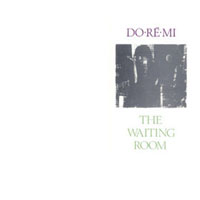
The Waiting Room is the second EP by Australian rock/pop group Do-Ré-Mi and was released by independent label Larrikin Records in January 1983. The album has six tracks, which were written by lead vocalist Deborah Conway, drummer Dorland Bray, bass guitarist Helen Carter and guitarist Stephen Philip. "Man Overboard" made its first appearance on this EP, but was re-worked and released as a single in 1985 to become a surprise top 5 hit, it included lyrics referring to anal humour, penis envy and pubic hair; and had no chorus. Paul Hester, later drummer for Split Enz and Crowded House, was living with Conway and guested on timbales for the track, "(Just Like) Hercules".

Do-Ré-Mi or Standing on Wires is the debut EP album by Australian rock/pop group Do-Ré-Mi which was released by independent label Green Records in August 1982. The album has four tracks, which were written by lead vocalist Deborah Conway, drummer Dorland Bray, bass guitarist Helen Carter and guitarist Stephen Philip. Philip had been a session musician but was invited to join the band during recording in July.
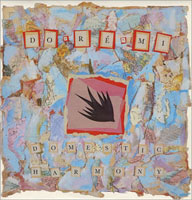
Domestic Harmony is the debut studio album by Australian rock/pop group Do-Ré-Mi which was released by Virgin Records in August 1985. The album has ten tracks, which were written by lead vocalist Deborah Conway, drummer Dorland Bray, bass guitarist Helen Carter and guitarist Stephen Philip.
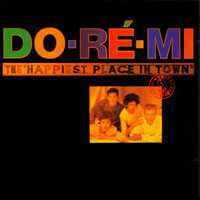
The Happiest Place in Town is the second and final studio album by Australian rock/pop group Do-Re-Mi and was released by Virgin Records in August 1988. The album has twelve tracks, which were written by lead vocalist Deborah Conway, drummer Dorland Bray, bass guitarist Helen Carter and guitarist Stephen Philip.

"Man Overboard" is a song by Australian rock/pop group Do-Ré-Mi recorded in 1982 for the EP The Waiting Room. The song was re-recorded in 1985 and released in May 1985 as the lead single from the group's debut studio album, Domestic Harmony. The 7" vinyl version has three tracks, which were written by lead vocalist Deborah Conway, drummer Dorland Bray, bass guitarist Helen Carter and guitarist Stephen Philip.

"Idiot Grin" is a song by Australian rock/pop group Do-Re-Mi released by Virgin Records in August 1985 as the second single from their debut studio album. The song peaked at number 43 in Australia.

"Guns and Butter" is a song by Australian rock/pop group Do-Ré-Mi released by Virgin Records in October 1986. The song peaked at number 48 on the Australian charts.

"King of Moomba" is a song by Australian rock/pop group Do-Ré-Mi released by Virgin Records in January 1988 as the second single from the group's second second album The Happiest Place in Town. The song was written by lead vocalist Deborah Conway, drummerDorland Bray, bass guitarist Helen Carter and guitarist Stephen Philip. While the B-side "Tearing up the Carpet" was written by Carter and Philip. The song peaked at number 52 on the Australian charts.
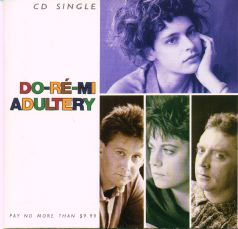
Adultery is a song by Australian rock/pop group Do-Ré-Mi, released by Virgin Records in October 1987, as the lead singe from the band's second studio album, The Happiest Place in Town. The song peaked at number 27 on the Australian charts.

"The Happiest Place in Town" is a song by Australian rock/pop group Do-Ré-Mi released by Virgin Records in May 1988 as the fourth and final single, from their second studio album The Happiest Place in Town.

Uncovered is a solo studio album by Australian singer John Farnham, produced by Little River Band's Graeham Goble, and released on 3 July 1980, which peaked at No. 20 on the Australian Kent Music Report Album Charts. Farnham's first single from the album was a reworking of The Beatles' song "Help!"; it peaked at No. 8 on the Kent Music Report Singles Chart. The second single "Please Don't Ask Me" didn't chart, however it was re-released in 1991 as a live version as part of the Full House album and became a Number #22 on the Aria music chart. in 2000, to coincide with its 20th anniversary, Uncovered the album was re-mastered by Goble and re-released.
















